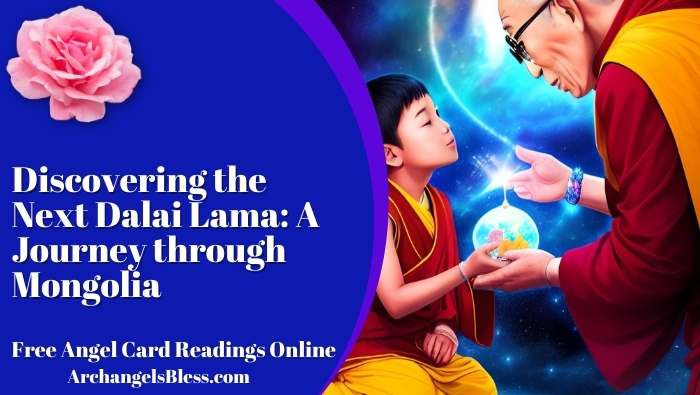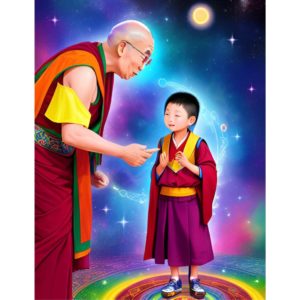Who Is The Next Dalai Lama? A Journey Through Mongolia…
Reincarnation Of The Dalai Lama
The search for the next Dalai Lama in Mongolia is a fascinating journey through the rugged terrain of the country, where officials and high lamas are seeking the reincarnation of the current Dalai Lama, Tenzin Gyatso.
For centuries, identifying the reincarnation of the Dalai Lama has been a sacred tradition in Tibetan Buddhism, and Mongolia has emerged as a possible location for the discovery of the next spiritual leader.
The current Dalai Lama, who is 86 years old, has expressed his wish to reincarnate in a free country, should he choose to do so.
However, the Chinese government, which has occupied Tibet since 1951, sees the selection of the next Dalai Lama as a political tool to further its interests in Tibet and insists on having a say in the selection process.
The Dalai Lama suggested that the Tibetan people should be left to select his reincarnation, and he might not reincarnate.
Journey Through Mongolia
Despite this, the search for the next Dalai Lama continues, and Mongolia is an important location for this journey.
Mongolian Connection To Tibetan Buddhism
The country deeply connects with Tibetan Buddhism, with many Mongolians following the religion.
Moreover, the government has a long history of hosting important religious figures, including the 3rd Dalai Lama, who spent several years in Mongolia in the 16th century.
Identifying The Reincarnation Of The Dalai Lama
The search process for the next Dalai Lama involves identifying children who show signs of being the reincarnation of the Dalai Lama, such as remembering details of their past lives or showing a deep interest in religion at a young age.
Selection Process For The Next Dalai Lama
Once identified, the child undergoes a series of tests and is put through a rigorous selection process to ensure that he is indeed the reincarnation.
However, searching for the next Dalai Lama is not just religious.
Tibetan Buddhism
It is also a highly political issue, with the Chinese government seeking to control the selection process.
Chinese Government And The Dalai Lama
Political Interference In The Selection Of The Next Dalai Lama
The Chinese government has even gone so far as to announce its selection of the Panchen Lama, the second-highest figure in Tibetan Buddhism, after abducting the child chosen by the Dalai Lama.
This move by the Chinese government has been widely criticized and viewed as an attempt to undermine the authority of the Dalai Lama and exert control over Tibetan Buddhism.
Despite the challenges posed by the Chinese government, the search for the next Dalai Lama continues in Mongolia.
The hope is that the next Dalai Lama will be chosen fairly and transparently, free from political interference.
However, given the complex political situation surrounding the selection process, the question remains whether the current Dalai Lama will choose to reincarnate.
Legacy Of The Dalai Lama
The legacy of the Dalai Lama, whether he reincarnates or not, will continue to inspire millions worldwide who look to him as a symbol of peace, compassion, and wisdom.
Teachings Of The Dalai Lama
His teachings on nonviolence, human rights, and the environment have touched people’s hearts from all walks of life.
Respect For Tibetan Practices And Beliefs
His work promoting dialogue and understanding between different religions and cultures has earned him the respect and admiration of people worldwide.
The Dalai Lama Succession: Concerns of Tibetan Buddhists over Chinese Interference
The Dalai Lama is the Tibetan people’s influential spiritual and political leader.
He has been the face of the Tibetan struggle for freedom and autonomy from China for many years.
With the aging of the current Dalai Lama, there are concerns about how his successor will be chosen and the role of the Chinese government in this process.
This article explores the fears of Tibetan Buddhists over Chinese interference in the Dalai Lama succession and how the Dalai Lama is selected.
The Dalai Lama: A Brief Overview
Who is the Dalai Lama?
The Dalai Lama is the spiritual leader of Tibetan Buddhism.
He is also the political leader of the Tibetan people, although he has been in exile in India since 1959.
The current Dalai Lama is the 14th Dalai Lama, and he has been in this role since 1940.
The Role of the Dalai Lama
The role of the Dalai Lama in Tibetan Buddhism is multifaceted.
As the spiritual leader of Tibetan Buddhists, the Dalai Lama is responsible for providing guidance on religious matters and teachings and promoting peace and compassion.
In addition, the Dalai Lama has traditionally played a vital role in the political governance of Tibet, serving as both a spiritual and temporal leader.
The Dalai Lama has also been a prominent advocate for human rights and religious freedom within Tibet and worldwide.
Despite the Chinese government’s efforts to suppress the Dalai Lama’s influence, he remains an influential and respected figure among Tibetan Buddhists.
His teachings and guidance continue to be a source of inspiration and advice for millions of people.
Fears of Tibetan Buddhists over Chinese Interference in the Dalai Lama Succession
The History of Chinese Interference in Tibetan Affairs
The Chinese government has a long history of interference in Tibetan affairs.
After the Chinese Communist Party took control of Tibet in 1950, the Chinese government began a campaign of political repression and cultural assimilation.
This campaign intensified after the failed Tibetan uprising in 1959, which led to the Dalai Lama fleeing into exile in India.
The Chinese Government’s Role in the Dalai Lama Succession
The Chinese government has stated that it has the right to approve the Dalai Lama’s successor.
This is based on their claim that Tibet is part of China and that the Dalai Lama is a Chinese religious leader.
However, the Dalai Lama and many Tibetans reject this claim and argue that the selection of the Dalai Lama is a matter of Tibetan tradition and religious authority.
Concerns over Chinese Interference in the Selection of the Next Dalai Lama
Tibetan Buddhists are concerned that the Chinese government will interfere in selecting the next Dalai Lama.
They fear that the Chinese government will try to choose a successor who is loyal to China and who will not advocate for Tibetan autonomy or human rights.
This could lead to a split within the Tibetan community and further repression by the Chinese government.
Responses to Chinese Interference
The Dalai Lama has said he will not be reincarnated in Tibet if Tibet is not free.
He has also suggested that he may choose his successor rather than following the traditional process of reincarnation.
This would make it more difficult for the Chinese government to interfere in the selection process.
Other Tibetan Buddhist leaders have also expressed their opposition to Chinese interference.
They have called for the international community to support the Tibetan people’s struggle for freedom and autonomy.
How is the Dalai Lama Selected?
The Process of Reincarnation
The selection of the Dalai Lama is based on the belief in reincarnation in Tibetan Buddhism.
When a Dalai Lama dies, his soul is believed to be reincarnated in a new body.
Identifying the reincarnated Dalai Lama involves various religious and political authorities.
The Search for the Reincarnated Dalai Lama
After the death of the Dalai Lama, a search party is sent out to find the reincarnated Dalai Lama.
This search party looks for a child who exhibits sure signs, such as…
Signs of the Reincarnated Dalai Lama
The search party looks for a child who exhibits signs that they may be the reincarnated Dalai Lama.
These signs include being born at a specific time, having knowledge of the previous Dalai Lama’s possessions and habits, and recognizing religious objects that belonged to the last Dalai Lama.
The Selection Process
Once a child is identified as a potential reincarnation, the selection process begins.
This involves various religious and political authorities, including the Dalai Lama’s senior attendants, the Tibetan government, and the Chinese government.
The process typically involves several rounds of tests and interviews to confirm the child’s identity as the reincarnated Dalai Lama.
The Role of the Chinese Government
While the selection of the Dalai Lama is traditionally a matter of Tibetan religious authority, the Chinese government has increasingly asserted its right to play a role in the selection process.
In recent years, the Chinese government has insisted that it must approve the selection of the next Dalai Lama and has threatened to choose its successor if the Tibetans do not comply.
Challenges to the Traditional Process
The Chinese government’s interference in selecting the next Dalai Lama has raised significant challenges to the traditional process of identifying the reincarnated Dalai Lama.
Many Tibetan Buddhists worry that the Chinese government will choose a successor who is loyal to China and who will not advocate for Tibetan autonomy or human rights.
Conclusion
The Dalai Lama is an influential spiritual and political leader for the Tibetan people, and the selection of his successor is a matter of great concern for Tibetan Buddhists.
Fears of Chinese interference in the process have raised significant challenges to the traditional approach of identifying the reincarnated Dalai Lama.
While the future of the Dalai Lama’s succession remains uncertain, it is clear that the Tibetan people are committed to ensuring that their traditions and beliefs are respected and protected.
FAQs
What is the role of the Dalai Lama in Tibetan Buddhism?
The Dalai Lama is considered the spiritual leader of Tibetan Buddhism and is responsible for the spiritual and political guidance of the Tibetan people.
Why are Tibetan Buddhists concerned about Chinese interference in the Dalai Lama succession?
Tibetan Buddhists are concerned that the Chinese government will try to choose a successor who is loyal to China and who will not advocate for Tibetan autonomy or human rights.
How is the Dalai Lama selected?
The selection of the Dalai Lama is based on the belief in reincarnation in Tibetan Buddhism and involves a complex process of identifying the reincarnated Dalai Lama.
What is the Chinese government’s role in the Dalai Lama succession?
The Chinese government has insisted that it approve the selection of the next Dalai Lama and has threatened to choose its successor if the Tibetans do not comply.
What are the responses to Chinese interference in the Dalai Lama succession?
The Dalai Lama has said that he may choose his successor. Other Tibetan Buddhist leaders have called for the international community to support the Tibetan people in their struggle for freedom and autonomy.
You may also enjoy…
Receive FREE Angel Card Readings [Anytime Day or Night]
What Do The Angels Say About What Would You Do If Money Were No Object?
The Healing Powers of Disney World: Real or Just Magic?
If you'd like to embody your highest Divine light here on earth, you can view all my offerings here.

Energy Interference Scan [15-Min Guided Meditation] FREE DOWNLOAD
Pinpoint Your Primary Energy Interferences So You Can Embody Your Highest Divine Light Level.




0 Comments